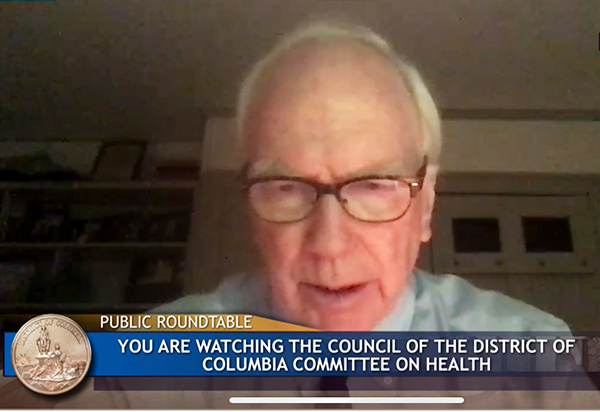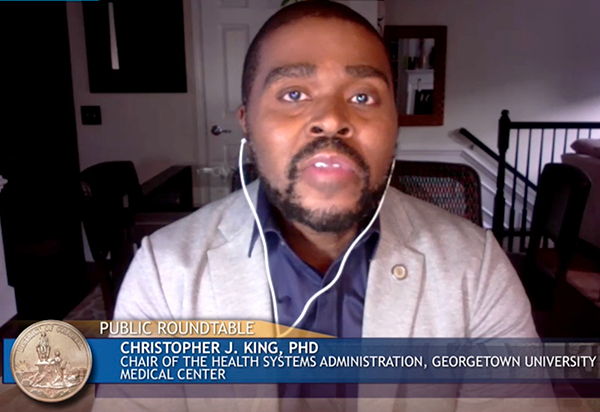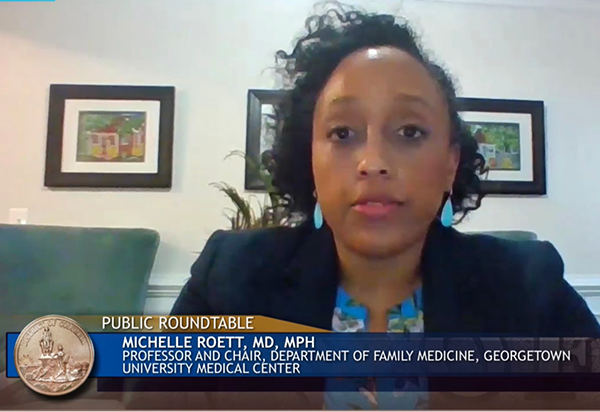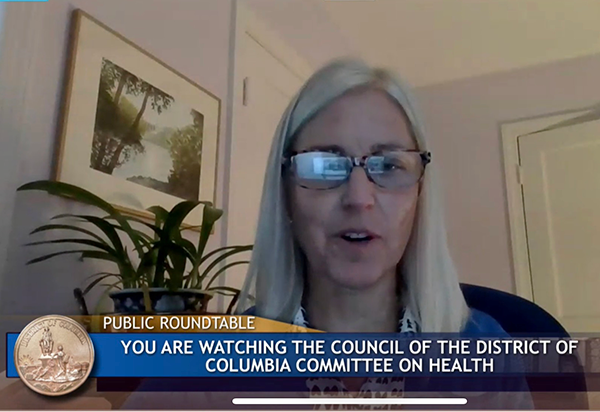Georgetown Faculty, Students Testify in Support of Resolution to Declare Racism a Public Health Crisis in DC

Posted in GUMC Stories | Tagged health disparities, population health, public health, racial equity, racism
Update: On December 1, 2020 the DC Council voted in favor of a resolution declaring racism as a public health crisis.
(November 8, 2020) — Members of the Georgetown University community testified in support of a proposed resolution declaring racism a public health crisis at a recent DC Council Committee on Health public roundtable. Representatives from MedStar Health, George Washington University, Howard University and the District of Columbia Hospital Association joined with unified messages in favor of the measure.

Ward 7 Councilmember Vincent Gray, the chairman of the committee and former DC mayor, hosted the virtual discussion on November 5 for the legislation introduced by Ward 5 Councilmember Kenyan McDuffie.
Edward B. Healton, MD, MPH, Georgetown University Medical Center’s executive vice president for health sciences, led the Georgetown panel of speakers.
“The seemingly intractable and enduring problem of unequal health outcomes due to systemic racism is one of the most important health equity and social justice issues of our time, and a significant part of our affirmed priority areas of focus at the medical center,” he said.
‘Cultural Humility’
Christopher King, PhD, associate professor and chair of the Department of Health Systems Administration at the School of Nursing & Health Studies, highlighted stunning data on entrenched health and socioeconomic disparities from his recently published report, Health Disparities in the Black Community: An Imperative for Racial Equity in the District of Columbia.

When compared with whites, the number of Black DC residents who die from diabetes-related complications is six times higher; heart disease is 2.5 times higher; prostate cancer is four times higher; and obesity rates are three times higher. King says the infant mortality rate in Ward 8, where 92% of residents are Black, is six times higher than Ward 3, where 81% of residents are white.
“The health care system, alone, cannot fix these findings,” said King, who also serves on the DC Commission on Health Equity. “The data continue to tell us that what we are doing now is just not working.”
King explained that since the death of George Floyd, he has been inundated with requests from hospital leaders grappling with how to address racial injustice in their institutions and their communities. He says one approach is to create experiences of “cultural humility” for decision-makers who are often far removed from the lived experiences of those they serve.
“If we’re going to improve people’s health care experiences, we have to look at how we are delivering services and we have to apply a racial equity lens; apply racial equity concepts in decision-making … in how resources are allocated,” King said. “How do we make sure that the decisions we are making aren’t disproportionately burdening people of color? That’s what this resolution gets us closer to doing.”

Training Future Generations
Michelle Roett, MD, MPH, professor and chair of Georgetown’s Department of Family Medicine at the School of Medicine, director of DC AHEC, and co-chair of the Racial Justice Committee for Change, said that addressing inequities requires a multilayered approach. She emphasized a focus on training students, residents, leaders and health care teams to advance health equity and “on how the effects of implicit bias, discrimination and racism can really detrimentally affect our communities, and how they can change the behaviors to take care of their patients in a way that’s much more beneficial. I think we’re at the beginning stages of that.”

Law professor Vicki Girard, JD, director of the Georgetown University Health Justice Alliance — a medical-legal partnership between Georgetown Law and Georgetown University Medical Center — advocated for training future health care professionals and lawyers to work together.
“It helps them do their jobs better, because we know medical care alone is not enough, and because sometimes access to justice and legal advocacy is the only way to overcome the barriers that prevent people from achieving good health and well-being,” she told Gray.
“Sometimes people need a lawyer to be healthy.”
Students Respond
Georgetown medical student L. Tamara Wilson (M’21) testified that she plans to use her position as a future physician to address the medical needs of underserved communities. And while she has long since known about disparate health outcomes in people of color, the recent pandemic has had a personal impact.
“I have witnessed firsthand how systematic racism impacts Black communities as several members of my family have contracted COVID-19 and 12 family members have ultimately passed away,” Wilson said.
Wilson’s classmate S. Janae Van Buren (M’21) underscored the need for urgent action.
“It is a fact that racism is and has been hurting our patients and the DC community, and we cannot deny it any longer,” Van Buren said. “We must call and treat racism in DC as it is: a crisis requiring an emergency, multidisciplinary, robust response.”
She closed by emphasizing the importance of “holding ourselves and our institutions accountable — because only by doing that will our patients, regardless of what ward they live in, be able to experience the health they deserve as a human being.”
Wilson and Van Buren are active members of the medical center’s Racial Justice Committee for Change (RJCC), launched last summer to address systemic racism and develop specific recommendations to achieve racial equity in admissions, education and the diversity of faculty, students and staff across schools and programs at the Georgetown University Medical Center campus.
Roett, one of four co-chairs of the RJCC, said she is encouraged by early initiatives to address health inequities underway at Georgetown. “Institutions need to make this a priority, and I’m really pleased to see Georgetown University Medical Center and MedStar Health are making it a priority.”
Reflecting on the day, Healton affirmed, “This was an important opportunity to voice our support for this resolution and to make recommendations focused on addressing the health consequences of systemic racism. We also heard Chairman Gray challenge us to work with him to make real change so that we do not have to come back together ‘and have the same conversation over again.’ We are committed to take advantage of that invitation and work collectively with our sister institutions to address systemic racism and its impact on inequitable health.”
Written testimony regarding the resolution will be accepted through November 19. A vote on the resolution is expected later this month.
Karen Teber
GUMC Communications
